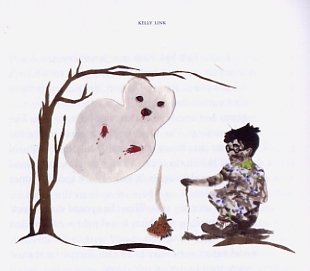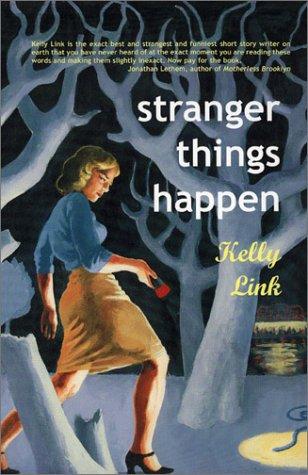
In September 2001, Kelly Link was interviewed about Stranger Things Happen by Laura Miller for Salon. Here are excerpts concerning some of her stories and their themes. The full interview can be read here.
-------
The Specialist’s Hat
One striking thing about your stories is their powerful atmosphere. In "The Specialist's Hat," for example, it's not always crystal clear what's going on, but there are a lot of intimations, and the intimations are all pretty disturbing. I'm wondering if when you write a story like that, in which the reader doesn't quite know what's happening, is there a lot that you, the writer, know but that you're not telling us? Or do you prefer to not even know yourself?
I think both. With a story like that, or with the story "The Girl Detective," I'll start out thinking, "I'll write a ghost story" or "I'll write a detective story." Then I'll begin and think, "I can't do this. I can't put this together." So I'll write around the ghost story, vaguely sort of a ghost story, but not really. I'll know when it's not the story that I meant to write, but if people ask me questions, like, "What exactly happened here?" my brain will shut down and I'll say, "I don't know!"
So if I asked you: What isthe specialist's hat ...?
Well, I can answer that. There's a museum called the Peabody Museum. I went there with my sister. There was a display case with a description for the hat, but there was no hat in it. It was empty. I thought that was wonderful.
So the story was inspired by a strange experience?
Yes, especially because I went back later to look for the display case, and I never found it again. Another writer, Shelley Jackson, who incidentally did the cover art for my book, read the story when it was published and said, "I saw that! I saw that in the museum!" But by that time she was living in California, and she couldn't really describe to me where in the museum she had seen it.
Do a lot of things like that happen to you?
No, fortunately.
----------
Flying Lessons
In one of your stories, "Flying Lessons," which is set in England, you bring in some of those odd details from Greek myths, and you fuse them with the story of this modern girl and her equally odd romance with a boy. In fact, relationships are the focus of a lot of these stories. What inspired that fusion?
Part of it is that I'm fascinated with romance as a genre. If you sit down to write a romance novel, it's like a sonnet; all the rules are in place. It has to have this kind of ending. Depending on the type of romance, it has to have this kind of sex, but not before a certain point. Part of that story was that I was trying to figure out the structure of a romance story. And I was very interested in London subway names at the time, so that got in there, too. This was one of those stories where a lot of ideas got stuck together.
Romance is a big theme throughout these stories -- everything from the dead man writing letters to his wife but not being able to remember her name to the crabby young woman trying to find her boyfriend who was kidnapped by the Snow Queen. It's a very modern voice describing a very archetypal journey.
Romance is a genre I'm always thinking about. It's such a closed, imperfect form. It seems imperfect to me because the endings never seem real. It's just the point at which the book happens to stop. When you read a romance novel, and you're thinking seriously, you think, "Well, those people are not going to be happy together." And I would much rather write about that.
--------------
The Girl Detective
One of my favorite stories is "The Girl Detective." Anyone who's read a lot of Nancy Drew knows that there's always this nagging question: What happened to her mother? In your story, the girl detective -- who's never named, but we all know who she is -- goes to the underworld to find her mother. What inspired that? Nancy's missing mom?
In a lot of fiction, maybe because it makes the story more interesting, you get rid of a parent. You create an imbalance or a gap that has resonance all through the story. So we read a lot of stories like that and you start to think, well, that's not very fair to the mother. That was something that bothered me. And I had a couple of stories where something bad had happened to mothers. Reading more contemporary stuff, I started thinking about all the mothers who aren't in stories. The other place where something like that happens is in Greek mythology, where Ceres goes down to the land of the dead to find her daughter, Persephone. I wanted to reverse it.
You switched the relationship around?
Yes. I was just watching "O Brother, Where Art Thou?" which is based on "The Odyssey," and each time I see it, at the part where they're in the movie theater, I think that's really the underworld and it's a shade telling them, "Do not seek the treasure." I thought that was great. There's a whole tradition of writers who do this. Angela Carter is one, and there's a fabulous writer named Howard Waldrop who's mostly out of print now who likes to mix these things up, Buster Keaton and fairy tales and all kinds of things. He'll mix up [Christopher] Marlowe, the playwright, with Marlow from "Heart of Darkness." That always seems like a good starting place for a story to me, if you take themes, or two personalities that have something that relates, and begin to play around with that.
-------
The Specialist’s Hat
One striking thing about your stories is their powerful atmosphere. In "The Specialist's Hat," for example, it's not always crystal clear what's going on, but there are a lot of intimations, and the intimations are all pretty disturbing. I'm wondering if when you write a story like that, in which the reader doesn't quite know what's happening, is there a lot that you, the writer, know but that you're not telling us? Or do you prefer to not even know yourself?
I think both. With a story like that, or with the story "The Girl Detective," I'll start out thinking, "I'll write a ghost story" or "I'll write a detective story." Then I'll begin and think, "I can't do this. I can't put this together." So I'll write around the ghost story, vaguely sort of a ghost story, but not really. I'll know when it's not the story that I meant to write, but if people ask me questions, like, "What exactly happened here?" my brain will shut down and I'll say, "I don't know!"
So if I asked you: What isthe specialist's hat ...?
Well, I can answer that. There's a museum called the Peabody Museum. I went there with my sister. There was a display case with a description for the hat, but there was no hat in it. It was empty. I thought that was wonderful.
So the story was inspired by a strange experience?
Yes, especially because I went back later to look for the display case, and I never found it again. Another writer, Shelley Jackson, who incidentally did the cover art for my book, read the story when it was published and said, "I saw that! I saw that in the museum!" But by that time she was living in California, and she couldn't really describe to me where in the museum she had seen it.
Do a lot of things like that happen to you?
No, fortunately.
----------
Flying Lessons
In one of your stories, "Flying Lessons," which is set in England, you bring in some of those odd details from Greek myths, and you fuse them with the story of this modern girl and her equally odd romance with a boy. In fact, relationships are the focus of a lot of these stories. What inspired that fusion?
Part of it is that I'm fascinated with romance as a genre. If you sit down to write a romance novel, it's like a sonnet; all the rules are in place. It has to have this kind of ending. Depending on the type of romance, it has to have this kind of sex, but not before a certain point. Part of that story was that I was trying to figure out the structure of a romance story. And I was very interested in London subway names at the time, so that got in there, too. This was one of those stories where a lot of ideas got stuck together.
Romance is a big theme throughout these stories -- everything from the dead man writing letters to his wife but not being able to remember her name to the crabby young woman trying to find her boyfriend who was kidnapped by the Snow Queen. It's a very modern voice describing a very archetypal journey.
Romance is a genre I'm always thinking about. It's such a closed, imperfect form. It seems imperfect to me because the endings never seem real. It's just the point at which the book happens to stop. When you read a romance novel, and you're thinking seriously, you think, "Well, those people are not going to be happy together." And I would much rather write about that.
--------------
The Girl Detective
One of my favorite stories is "The Girl Detective." Anyone who's read a lot of Nancy Drew knows that there's always this nagging question: What happened to her mother? In your story, the girl detective -- who's never named, but we all know who she is -- goes to the underworld to find her mother. What inspired that? Nancy's missing mom?
In a lot of fiction, maybe because it makes the story more interesting, you get rid of a parent. You create an imbalance or a gap that has resonance all through the story. So we read a lot of stories like that and you start to think, well, that's not very fair to the mother. That was something that bothered me. And I had a couple of stories where something bad had happened to mothers. Reading more contemporary stuff, I started thinking about all the mothers who aren't in stories. The other place where something like that happens is in Greek mythology, where Ceres goes down to the land of the dead to find her daughter, Persephone. I wanted to reverse it.
You switched the relationship around?
Yes. I was just watching "O Brother, Where Art Thou?" which is based on "The Odyssey," and each time I see it, at the part where they're in the movie theater, I think that's really the underworld and it's a shade telling them, "Do not seek the treasure." I thought that was great. There's a whole tradition of writers who do this. Angela Carter is one, and there's a fabulous writer named Howard Waldrop who's mostly out of print now who likes to mix these things up, Buster Keaton and fairy tales and all kinds of things. He'll mix up [Christopher] Marlowe, the playwright, with Marlow from "Heart of Darkness." That always seems like a good starting place for a story to me, if you take themes, or two personalities that have something that relates, and begin to play around with that.

No comments:
Post a Comment